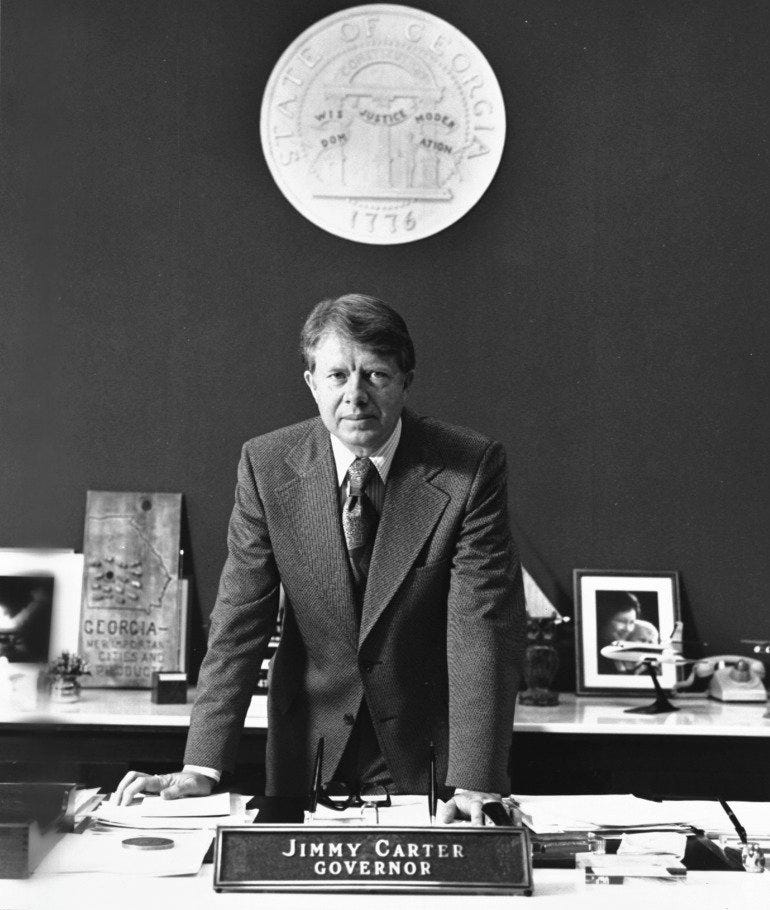Complicating Jimmy Carter
I have an obituary for Jimmy Carter with Time in which I hit all the standard points: Carter was the true Great Deregulator who played an important role in laying the foundation for American prosperity over the next quarter century. He remains one of the most underrated US presidents.
The 39th president scored enormous policy successes—but observers often missed them because they didn’t grasp that Carter was one of the most substantively conservative presidents of the last half-century. In some ways, Carter actually did more to push American economic policy to the right than his Republican successors Ronald Reagan, George H.W. Bush, George W. Bush, and Donald Trump. Understanding this reality paints Carter’s presidency in a totally different light.
But I want to briefly offer a counterpoint to the eucharistic excess dominating newspaper headlines this morning. Jimmy Carter might have been a Sunday school teacher, a humble peanut farmer, and a builder of homes for the needy, but he was no saint. On his scramble up to the Oval Office, he was willing to defy his personal convictions and get his hands dirty.
For example, while it is true that Carter left his Southern Baptist church over its refusal to integrate, as a candidate for governor of Georgia in 1970 he knew he needed to woo the segregationist vote. A Carter campaign official distributed race-baiting leaflets — including at a Ku Klux Klan rally — showing Carter’s opponent, Carl Sanders, an Atlanta Hawks owner, being showered with victory champagne by a black basketball player. The implication was that Sanders was too familiar with the help and thus couldn’t be trusted to toe the white supremacist line.
Similarly, some eulogists have made much of Carter’s refusal to join the White Citizens’ Council, which is true, so far as it goes. But Carter’s personal principles wouldn’t get in the way of his promise to renominate Roy Harris, a former chair of the Georgia White Citizens’ Council, as a regent of the University of Georgia system even after a scandal involving Harris’s baldly racist comments.
In general, Carter tried to play the field, courting civil rights activist Vernon Jordan by saying “you won’t like my campaign, but you will like my administration.” He declaimed that “Georgians are deeply conservative, but are not racists” while promising to send “seasoned and trained troops” to put down segregation protests.
The uncomfortable reality is that Carter was willing to perform white supremacy to advance his political career. Practically speaking, there is little difference between Carter’s song-and-dance in the 1970s and Richard Nixon’s infamous “Southern Strategy”; attracting white supremacist voters without alienating moderates was just Jimmy Carter’s Georgia strategy writ large.
It is also ironic that Carter, known for his dovish foreign policy as president, was an eager chickenhawk when needed. One of Carter’s first acts as Georgia Governor in March 1971 was to declare “American Fighting Men’s Day” to satiate conservatives outraged by the conviction of disgraced Army Lieutenant William Calley for his role in the My Lai massacre in Vietnam. Carter called Calley a “scapegoat” and said his conviction would deal a “blow to troop morale.” He called on car owners to drive with their vehicle headlights on in order to “honor the flag as Rusty [Calley’s nickname] had done.”
Later, while on the presidential campaign trail in 1976, Carter would deny feeling anything “except abhorrence” towards Calley, an understandable flip-flop given the shift in public opinion on the Vietnam War. But if I were to lightly rework the above paragraph, there’d be little daylight between Carter’s rhetoric and Donald Trump’s justification for pardoning war criminals from the Iraq War.
Now, it’s true that Carter was no more racist than his predecessor or successor. That’s a reminder of how deeply racism has been woven into the fabric of American life. And Carter is hardly the first politician to thump his chest over wartime atrocities. I suppose if there is a moral to the story, it’s that those who would be president — even the best of them, and from both parties — are so often willing to indulge the vilest impulses. And they do it because they believe we want them to.


Nice essay. In terms of foreign policy, the failure to rescue the hostages in Iran stands out, of course, but Carter also 1) did not get them killed; and 2) initiated the Carter Doctrine, including the development of the Rapid Deployment Force, stating the US policy to defend our interests in the Persian Gulf region, something all Presidents since have followed.
Love the last line